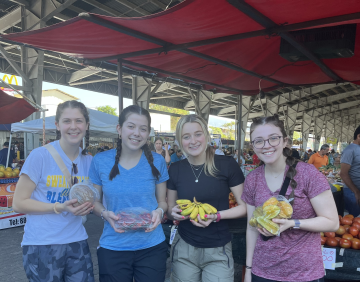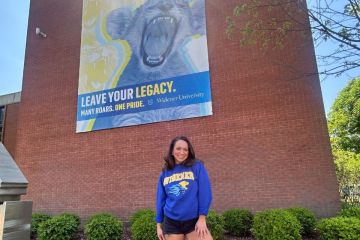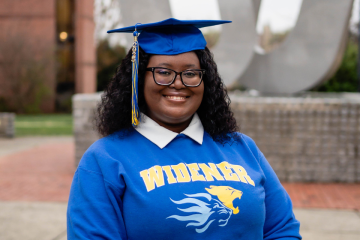Students Explore Consumerism, Tourism, Sustainability, and Culture in Costa Rica

Opportunities to travel internationally with peers and faculty can have a profoundly positive impact on the student experience. Students in a “Coffee, Culture, and the Environment in Costa Rica” class got a first-hand look at the coffee and tourism industries in the Central American country’s Monteverde region earlier this year.
Beatriz Urraca, chair of Spanish, and Stephen Madigosky, chair of environmental science and sustainability, accompanied the spring semester class. Both professors have a history of researching the coffee industry in Costa Rica, its history and culture, and its impact on the environment and the Costa Rican economy through global coffee consumption.
“We wanted to construct a series of interactive lessons on sustainability, so students could see – up close and personal – what needs to be done to operate in a sustainable manner in a tropical environment such as Costa Rica,” said Madigosky.
The pair led students to about a dozen sites around the Monteverde area, including farms, laboratories, parks, and tourist destinations. The experience gave students a full picture of local life.
“It was such a unique experience to be completely immersed into another culture,” said Bella Krohmer ’26. “We were in many people’s homes, even sitting at their dinner table. In general, the way of life is just much slower and calmer in Costa Rica.”
“The idea is to provide students with life skills in communication, emotional intelligence, and marketability. When we go to another country, we are a type of tourist, and we are a source of income to a community. We have an impact on that community, so it is important for us to expose students to the impact they are having,” Urraca explained.
Krohmer, a nursing major with a Spanish minor, took the trip as a first-year Widener student. Hoping to become a nurse practitioner who works with mothers and babies, she found being immersed in the Costa Rican community was vital to improving her communication skills.
“I gained a lot of experience and confidence in my Spanish speaking. This provides me with skills to communicate with a plethora of people and provide them with the best possible care as a future nurse,” she said.
Urraca emphasized, “Even if you don’t speak Spanish, you have to communicate in some way, so this is a skill that speaks to adaptability and intercultural communication.”
Naomi Knight ‘25, a psychology major on the pre-physical therapy 3+3 track who is minoring in African American Studies, is not a frequent coffee consumer, but she enrolled in the class because she was interested in the topic and travel component.
“I love traveling with the intent to learn about the culture, customs, and practices of the new country because it just expands my knowledge on humanity and all the different things I didn’t know about that part of the world,” Knight shared. “The fact that I was able to travel over spring break and have the chance to experience all of the topics that were covered in lectures made me cherish the trip even more.”
Like Krohmer, Knight strengthened her communication skills and understanding of the Costa Rican way of life. She also learned about sustainability and environmental impact through a new lens.
“Many things are practiced in the United States that deplete our sustainability such as the heavy use of pollutants on crops, the excessive amount of water used to flush toilets, and the lack of biodegradable products in simple things like napkins, straws, and cups,” she explained.
“The concept of sustainability cannot be overstated, especially now when the environment is rapidly changing. It is essential that students are exposed to different environments and cultures so that they can become responsible global citizens. By being immersed in this environment, it is easy to see how irresponsible tourism can have a profound impact on the social, economic, and environmental fabric of the entire region,” said Madigosky.
Urraca and Madigosky’s connections to Costa Rica continue to grow as they work to provide even more Widener students with the opportunity to travel and experience the country. Their efforts will be boosted by a federal IDEAS Grant, recently awarded to Widener under a program that aims to increase opportunities for students from groups that are traditionally underrepresented in study abroad programs.
With the grant, Urraca and Madigosky are planning to return to Costa Rica with students in the summer of 2024 for a 21-day international internship opportunity open to all Widener students.
“I believe everyone in college should study abroad once, whether it is a week, a month, or a year,” said Knight. “The world has so much to offer, and it is waiting for you to go and explore it!”





